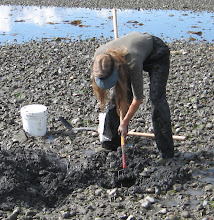(Talkeetna, AK) -- Alaskan residents have been forced to file an appeal in state Superior Court after the Alaska Department of Environmental Conservation (ADEC) reversed long-standing precedent by deciding to allow toxic herbicide spraying along Alaska Railroad rights-of-ways that threatens surface water and salmon-bearing waterbodies.
ADEC granted the Alaska Railroad Corporation a two-year permit in April 2010 to spray toxic herbicides (Aquamaster, active ingredient glyphosate) along portions of a 90 mile stretch of the railroad right-of-way from Indian to the Seward, including the Seward railroad yard. The railroad sprayed herbicides along Turnagin Arm and on the Kenai Peninsula during the summer of 2010. This spraying represented the first time in 26 years that herbicides toxic to fish, human health and the environment have been sprayed to control vegetation since a 1984 federal court injunction against such spraying.
Since the federal court injunction, Alaskan residents, borough, municipal and native governments, and non-governmental organizations have consistently opposed the issuance of any state pesticide permits to the railroad due to the toxic impacts on people, fish, wildlife, and the environment.
“The State of Alaska continually boasts about its so-called “rigorous permitting system,” said Becky Long of Alaska Survival. “Yet this is a historic rollback that will open the floodgates to toxic spraying at a time when mechanical weed removal is a proven treatment that creates more jobs.”
The ADEC permit allows toxic herbicide spraying on and around surface waters, including those known to be important for salmon migration and spawning.
“Scientific studies demonstrate that fish, wildlife and people are harmed by exposures to extremely low doses of this herbicide,” said Pamela K. Miller of the Alaska Community Action on Toxics. “Yet ADEC has ignored reasonable alternatives – such as wet infrared or mechanical removal – to address the problem.”
The ADEC permit does not require the Alaska Railroad to post written notice warning the public that toxic broadcast spraying has or will occur.
“The public has a right-to-know, especially in the Chugach National Forest and other public lands, about toxic spraying around our salmon streams,” said Bob Shavelson of Cook Inletkeeper. “Why does the Alaska Railroad have a right to pollute our public lands and salmon resources without telling Alaskans where and when they will spray?”
ADEC also denied Inletkeeper and its members “standing” on this issue, asserting Alaskan members of Inletkeeper who use and enjoy the waters and public lands in the vicinity of the toxic spraying do not have a right to question the agency’s decision.
The Alaskan groups are represented in their appeal to protect salmon habitat and water quality by attorney Paul Bratton of Talkeetna.
Subscribe to:
Post Comments (Atom)




1 comment:
Hi there! I will be looking forward to visit your page again and for your other posts as well. Thank you for sharing your thoughts about lawyer in your area. I am glad to stop by your site and know more about the lawyers. Keep it up! This is a good read. You have such an interesting and informative page.
In England, only solicitors were traditionally in direct contact with the client. The solicitor retained a barrister if one was necessary and acted as an intermediary between the barrister and the client. In most cases a barrister would be obliged, under what is known as the "cab rank rule", to accept instructions for a case in an area in which they held themselves out as practising, at a court at which they normally appeared and at their usual rates.
When hiring a lawyer, many people think only of the cost and often make the mistake of hiring the cheapest lawyer they can find. This certainly does not mean that hiring the most expensive lawyer is the best thing to do, either.
Lawyers Lowell, ma
Post a Comment